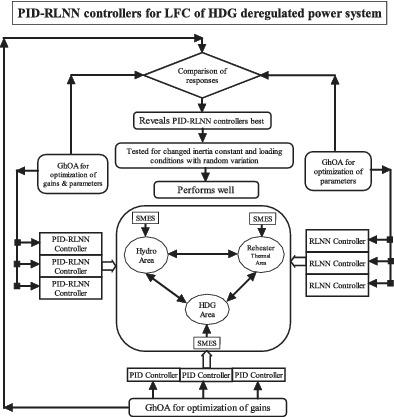当前位置:
X-MOL 学术
›
Int. Trans. Electr. Energy Syst.
›
论文详情
Our official English website, www.x-mol.net, welcomes your feedback! (Note: you will need to create a separate account there.)
PID‐RLNN controllers for discrete mode LFC of a three‐area hydrothermal hybrid distributed generation deregulated power system
International Transactions on Electrical Energy Systems ( IF 2.3 ) Pub Date : 2021-03-16 , DOI: 10.1002/2050-7038.12837 Milton Kumar Das 1 , Parthasarathi Bera 2 , Partha Pratim Sarkar 3
International Transactions on Electrical Energy Systems ( IF 2.3 ) Pub Date : 2021-03-16 , DOI: 10.1002/2050-7038.12837 Milton Kumar Das 1 , Parthasarathi Bera 2 , Partha Pratim Sarkar 3
Affiliation

|
The inequality between active power generation and load demand due to volatile power generation and random changes of load poses a challenge to maintain the system frequency. To address this, in the present work, reinforced learning neural network based–proportional‐integral‐derivative (PID‐RLNN) controllers are proposed in the discrete mode load frequency control (LFC) problems for a three‐area hydrothermal hybrid distributed generation (HDG) deregulated power system. The proposed power system is incorporated with super conducting magnetic energy storage system (SMES), and each control area is interconnected via AC/DC parallel links. The dynamic responses using PID‐RLNN controllers are compared with PID controllers and RLNN controllers for different loading conditions. The gains and parameters of all the controllers are optimized using grasshopper optimization algorithm (GhOA). Investigation reveals that the PID‐RLNN controllers give better dynamic performances compared to PID and RLNN controllers for different loading conditions. Sensitivity analyses are performed to investigate the robustness of the proposed controllers, and investigation reveals that their performances are quite robust for variation of inertia constant and loading conditions. The fluctuation of loads in each area is also considered to analyze the performances of proposed controllers and it is seen that the proposed PID‐RLNN controllers damp the oscillations of dynamic responses.
中文翻译:

PID-RLNN控制器,用于三区域热液混合分布式发电调节功率系统的离散模式LFC
由于不稳定的发电和负荷的随机变化,有功发电和负荷需求之间的不平等给维持系统频率带来了挑战。为解决此问题,在当前工作中,针对三区域水热混合分布式发电(HDG)的离散模式负载频率控制(LFC)问题,提出了基于增强学习神经网络的比例积分微分(PID-RLNN)控制器。 )电力系统解除管制。拟议的电力系统与超导磁能存储系统(SMES)结合在一起,每个控制区域通过AC / DC并联链路互连。对于不同的负载条件,将使用PID-RLNN控制器的动态响应与PID控制器和RLNN控制器进行比较。所有控制器的增益和参数都使用蚱hopper优化算法(GhOA)进行了优化。研究表明,与PID和RLNN控制器相比,对于不同的负载条件,PID-RLNN控制器具有更好的动态性能。进行了灵敏度分析,以研究所提出控制器的鲁棒性,并且调查表明,它们的性能对于惯性常数和负载条件的变化都非常鲁棒。还考虑了每个区域中负载的波动,以分析所提出的控制器的性能,并且可以看出所提出的PID-RLNN控制器可以抑制动态响应的振荡。研究表明,与PID和RLNN控制器相比,对于不同的负载条件,PID-RLNN控制器具有更好的动态性能。进行了灵敏度分析,以研究所提出控制器的鲁棒性,并且调查表明,它们的性能对于惯性常数和负载条件的变化都非常鲁棒。还考虑了每个区域中负载的波动,以分析所提出的控制器的性能,并且可以看出所提出的PID-RLNN控制器可以抑制动态响应的振荡。研究表明,与PID和RLNN控制器相比,对于不同的负载条件,PID-RLNN控制器具有更好的动态性能。进行了灵敏度分析,以研究所提出控制器的鲁棒性,研究表明,它们的性能对于惯性常数和负载条件的变化都非常鲁棒。还考虑了每个区域中负载的波动,以分析所提出的控制器的性能,并且可以看出所提出的PID-RLNN控制器可以抑制动态响应的振荡。
更新日期:2021-05-03
中文翻译:

PID-RLNN控制器,用于三区域热液混合分布式发电调节功率系统的离散模式LFC
由于不稳定的发电和负荷的随机变化,有功发电和负荷需求之间的不平等给维持系统频率带来了挑战。为解决此问题,在当前工作中,针对三区域水热混合分布式发电(HDG)的离散模式负载频率控制(LFC)问题,提出了基于增强学习神经网络的比例积分微分(PID-RLNN)控制器。 )电力系统解除管制。拟议的电力系统与超导磁能存储系统(SMES)结合在一起,每个控制区域通过AC / DC并联链路互连。对于不同的负载条件,将使用PID-RLNN控制器的动态响应与PID控制器和RLNN控制器进行比较。所有控制器的增益和参数都使用蚱hopper优化算法(GhOA)进行了优化。研究表明,与PID和RLNN控制器相比,对于不同的负载条件,PID-RLNN控制器具有更好的动态性能。进行了灵敏度分析,以研究所提出控制器的鲁棒性,并且调查表明,它们的性能对于惯性常数和负载条件的变化都非常鲁棒。还考虑了每个区域中负载的波动,以分析所提出的控制器的性能,并且可以看出所提出的PID-RLNN控制器可以抑制动态响应的振荡。研究表明,与PID和RLNN控制器相比,对于不同的负载条件,PID-RLNN控制器具有更好的动态性能。进行了灵敏度分析,以研究所提出控制器的鲁棒性,并且调查表明,它们的性能对于惯性常数和负载条件的变化都非常鲁棒。还考虑了每个区域中负载的波动,以分析所提出的控制器的性能,并且可以看出所提出的PID-RLNN控制器可以抑制动态响应的振荡。研究表明,与PID和RLNN控制器相比,对于不同的负载条件,PID-RLNN控制器具有更好的动态性能。进行了灵敏度分析,以研究所提出控制器的鲁棒性,研究表明,它们的性能对于惯性常数和负载条件的变化都非常鲁棒。还考虑了每个区域中负载的波动,以分析所提出的控制器的性能,并且可以看出所提出的PID-RLNN控制器可以抑制动态响应的振荡。



























 京公网安备 11010802027423号
京公网安备 11010802027423号